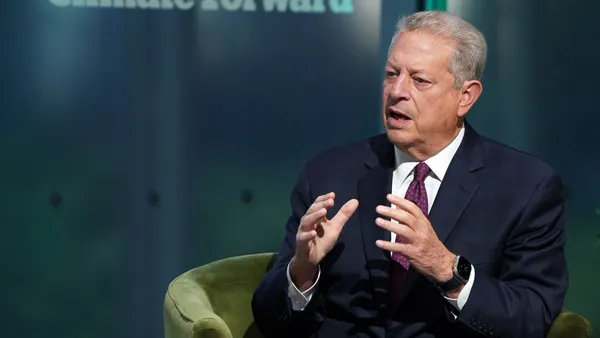Dive Brief:
- Over three-quarters of Americans — 78% — have not heard of ESG or don’t have a good grasp of what the acronym means, according to a nationally representative survey published earlier this month.
- Of the 1,012 people surveyed in the U.S. between July to August, only 22% said they had a good understanding of what ESG entails, up from 15% in 2022. Respondents who most likely understood the concept belonged to subgroups such as college-educated Americans, millennials, men and Republicans.
- Despite this low awareness of environmental, social and governance issues, the findings indicate that Americans still consider ESG factors when making political, consumer or employment decisions.
Dive Insight:
The Global ESG Monitor report, organized by public affairs and research firm Global Strategy Group and communications group SEC Newgate, said it aims to help executives understand how expectations on ESG are changing; what ESG actions they should leverage in their communications and what risks they should mitigate; and how to “weave ESG into a compelling and authentic narrative.”
The survey also noted that there is evidence of an emerging “trust gap” between what most Americans think companies ought to be doing with environmental and social responsibility initiatives and what they see or believe companies are actually doing. From the respondents surveyed, only 4 in 10 believe companies are behaving ethically or using their platform to create positive change.
Despite the ambiguity surrounding the acronym, 72% of respondents said it was important for companies to take action on ESG issues, especially those that are important to their employees and customers. The majority of respondents who advocated for this identified as Hispanic or Latino Americans and Gen Z Democrats.
Companies’ social practices were a recurring highlight of the survey’s findings: 1 in 5 women believed their employer was doing a poor job on salary and benefits, and 1 in 4 people of color rated their company as “poor” when it came to promoting diversity and inclusion in the workforce.
The report implied that the best method to address the “trust gap” as companies execute their ESG framework is to develop a consistent and regulated reporting approach. The survey also noted that as there is no universally agreed upon definition of ESG, companies should use specific and clear language when describing the issues it engages in.
The survey comes amid heightened scrutiny and political discourse surrounding ESG. Environmental, social and governance issues have been a topic of debate both in presidential platforms and investment frameworks, influencing voter choice to investor choice.
Earlier this year, Florida Gov. Ron DeSantis signed legislation to “protect Floridians” from what his office described as “government- and corporate-sanctioned activism” and “a worldwide effort to inject woke political ideology across the financial sector.” The legislative measure was promoted as a blueprint for 18 other states — including Georgia, Iowa, Mississippi, Alabama — who formed an alliance to push back against what they call an “ESG agenda that is destabilizing the American economy and the global financial system.”
The ESG landscape survey findings also indicated there was an increased awareness of the term ESG among “ultra-conservatives.” Republicans accounted for 61% of the respondents who were familiar with the topic.
DeSantis’ ESG policies were followed by the nation’s two largest asset management firms, BlackRock and Vanguard, announcing they approved fewer environmental and social proposals in 2023.
Vanguard approved just 2% of environmental and social shareholder proposals for its U.S. portfolio companies during the 2023 proxy year, down from 12% in 2022, according to a company report released in August. The firm’s approval rating was similar to BlackRock’s, which also reported supporting a smaller percentage of environmental and social proposals in 2023.














